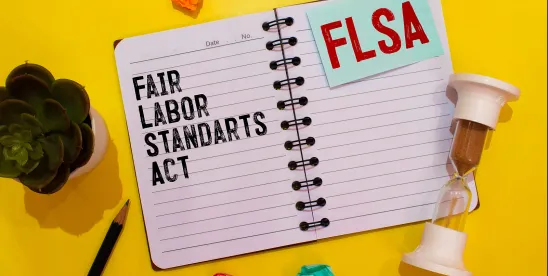Most companies know the Fair Labor Standards Act (“FLSA”) requires employers to pay employees a minimum hourly wage plus overtime, unless an exemption applies. What may be surprising, however, is how broadly the FLSA and courts applying it define who is an “employer.” The Eleventh Circuit Court of Appeals addressed this issue in Spears v Patel et al, a unanimous opinion where the Court found a hotel manager, who was not an owner or officer of the employer, could be held individually liable to the hotel’s front desk staff for FLSA violations.
Background
William Spears worked as a front desk clerk at hotels operated by Rick Patel Sr. and his son, Rick “Sunny” Patel Jr. Throughout his nearly decade-long employment at various hotels in Alabama operated by Rick Sr. and Sunny, Spears worked night shifts, usually 62 hours per week, and was compensated with monthly paychecks and onsite lodging. Like Spears, Sunny lived onsite and was a wage-earning employee of the hotel.
Although Rick Sr. ordinarily signed Spears’s paychecks, Sunny would sometimes sign them instead. Because Risk Sr. was based in Florida, Sunny was responsible for managing the day-to-day operations at the Alabama hotels. Spears understood Rick Sr. and Sunny collaborated on room rental rates and worked together to set hotel prices. Spears testified that he would then, at Sunny’s direction, adjust the room rental rates. Spears also testified that Sunny was his immediate supervisor and scheduled Spears’s shifts.
After the relationship between Spears and the Patels deteriorated, Spears sued the Patels and their hotel entities under the FLSA, alleging he was not paid the federal minimum wage during his employment and was owed overtime pay for each week in which he worked over 40 hours. The case went to a bench trial, where the presiding judge determined in relevant part that Spears was not paid the legally required minimum wage or overtime, and that both Patels were individually liable under the FLSA for those violations.
Ruling on Appeal
Sunny appealed that ruling, arguing he was not Spears’s “employer” as defined under the FLSA. Specifically, Sunny argued that he was not Spears’s employer because he did not have control or decision-making authority over Spears’s compensation and did not exercise control over the hotels’ finances. Sunny also pointed to the fact that he was a wage-earning employee of the hotels, rather than an owner or member of the limited liability company that owned the hotels where Spears worked.
The Eleventh Circuit Court, however, agreed with the trial court’s ruling that Sunny was Spears’s employer. The Court noted that “[a]lthough owners and corporate officers are more susceptible to personal liability because they are more likely to exercise operational control, the broad definition of an employer under the [FLSA] does not limit individual liability to officers and owners. We must consider the circumstances of the whole activity.” For a supervisor to have individual liability under the FLSA, they “must either be involved in the day-to-day operation or have some direct responsibility for the supervision of the employee[,]” including substantial “control over ‘significant aspects of the company’s day-to-day functions[,]” such as making regular visits to the company’s facilities, exercising discretion over employee salaries, being involved in the company’s business operations, or exercising “control over the company’s purse strings.” The Court emphasized that the definition of “employer” under the FLSA is very broad; anyone who has “some direct responsibility for the supervision of the employee” can be an employer—including managers.
The Eleventh Circuit also noted Sunny’s status as Spears’s day-to-day manager was only one reason that he is an employer under the FLSA—his involvement in company operations is another. Sunny was the son of Rick Sr., the owner of the company, and they consulted regularly on company financial matters like compensation and room rental rates. Accordingly, Sunny’s control was both substantial and related to the company’s obligations under the FLSA.
Takeaways
The Spears case highlights that non-executives can be held individually liable for a company’s FLSA violations. In the Eleventh Circuit—which covers Alabama, Georgia, and Florida—anyone with direct responsibility for employee supervision can be deemed an “employer” within the meaning of the FLSA. Moreover, other individuals within a company can also be deemed an “employer” of the company’s employees if the individual has substantial control over the business’s financials or other matters “related to” FLSA compliance. Accordingly, Human Resources employees who have control over employee compensation, for example, can be held individually liable for any FLSA violations by the company.
Penalties for FLSA can also be extensive. Employers who violate the FLSA can be liable to pay the difference from the applicable minimum wage and the overtime owed to employees for time worked in the preceding two years (or three years for willful violations), liquidated damages equal to those lost wages (effectively doubling the wage payments to the wronged employees unless the employer can show good faith), costs of litigation, and the employees’ attorneys’ fees. The ability to pursue FLSA claims on a collective basis also makes such cases much more lucrative, and thus appealing, to plaintiffs-side firms. “Employers” can also face criminal penalties for violations of FLSA laws, including criminal fines and, potentially, imprisonment.
Given such potential damages and penalties, it is important that all businesses inform their managers and other leadership of the FLSA’s requirements, that all non-exempt employees are properly classified and compensated for all time worked, and that employers routinely audit how they apply any exemptions to ensure they meet the FLSA’s requirements.





 />i
/>i
